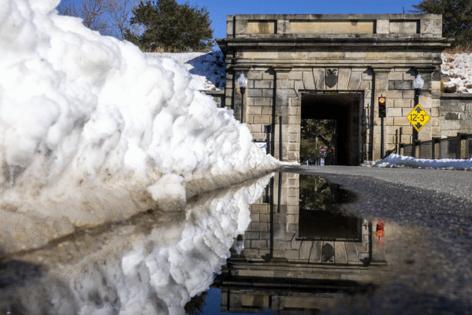Winter salt usage can hurt waterways -- environmentalists are looking for ways to help
Published in News & Features
Though salt can make roads safer during winter weather, environmental groups are working to find alternatives that are more friendly to local waterways.
“Excess salt from roads and parking lots ends up in local streams, rivers and the Chesapeake Bay, which is really bad news for freshwater critters like our smallmouth bass and freshwater mussels, which need clean, fresh water to survive,” said Joe Wood, senior scientist for the Chesapeake Bay Foundation. “Spiking salt levels send a real shock to the system for plants and animals that are used to freshwater.”
Salts can also damage infrastructure through corrosion, hurt native trees and plants and degrade the health of soil where it is used. Megan Rippy, an assistant professor in civil and environmental engineering at Virginia Tech, recently published research from a year-long study that found relying on salt-tolerant plants may not be enough to counteract excessive use of salt in deicing.
“Plants play an important role in green infrastructure performance, but only 1% of plants, known as halophytes, can handle highly saline environments,” Rippy. “This makes it important to characterize the threat salts pose to green infrastructure as well as the potential of salt tolerant species to mitigate that threat.”
The research found that basins draining from roads had the highest salt levels, causing significant stress to plants. Parking lots had “moderate” salt levels, and basins draining from grassy areas had little to no salt stress. Cattails showed the greatest ability to absorb salt, more than the other roughly 254 plants used in the study. Just under 50 native species could tolerate “high” salt levels, the research found.
“The amount of salt cattails remove is roughly equivalent to the mass of one to two adults,” Rippy said. “That pales in comparison to the amount we actually apply to the roads and parking lots, suggesting that we shouldn’t expect plants to be a silver bullet solution to our salinization problem.”
To avoid access use of salt, environmental experts urge the public to use alternative ways to melt ice during storms. The Chesapeake Bay Foundation recommends methods such as shoveling snow to prevent ice forming, and residents can talk to their homeowners associations and local leaders about minimizing salt usage when possible.
Other chemical melting products could contain harmful metals or cyanide, which is toxic, so the foundation also recommends reading labels carefully before use.
“We’re asking Virginians to be careful how much salt they’re using,” Wood said. “Talk to your HOAs, landlords, businesses and even your local government — let them know there are impacts from excess salt usage. You can find salt alternatives at the hardware store, like calcium magnesium acetate or even just plain sand.
“But overall, grabbing a snow shovel is really the best thing that can be done for the environment.”
_____
©2025 The Virginian-Pilot. Visit pilotonline.com. Distributed by Tribune Content Agency, LLC.







Comments